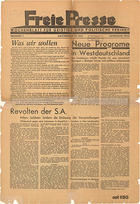 On the occasion of World Press Freedom Day, commemorated on 3 May every year, the IISH wishes to call attention to Freie Presse, a magazine published by German socialists during their exile in Amsterdam in 1933. Free press was prohibited in Germany as soon as Hitler came to power. Freie Presse aimed to counteract Nazi propaganda and inform German speakers outside the Third Reich. But the paper was also spread illegally in Germany.
On the occasion of World Press Freedom Day, commemorated on 3 May every year, the IISH wishes to call attention to Freie Presse, a magazine published by German socialists during their exile in Amsterdam in 1933. Free press was prohibited in Germany as soon as Hitler came to power. Freie Presse aimed to counteract Nazi propaganda and inform German speakers outside the Third Reich. But the paper was also spread illegally in Germany.
Soon after Hitler came to power, political and humanitarian initiatives were begun in the Netherlands. The Dutch SDAP and Trade Union Federation NVV held a protest meeting in the Diamond Exchange on 22 March 1933. The main target was the anti-Jewish policy of the Hitler regime. A Committee for Political German Refugees was established soon afterwards. This mixed committee was chaired by Emil Gross, former chairman of the Socialistische Studentenschaft in Berlin.
In May 1933, the idea of launching a German newspaper for the border region was born in SDAP circles. It was to be named Freie Presse, a widely circulated political-cultural weekly. Since the number of German speakers in the Netherlands was estimated at 400,000, it was assumed that a print run should be at least 20,000. Illegal distribution in Germany was considered necessary. The magazine was intended to counteract Nazi propaganda in Germany from a social democrat point of view, as well as in those regions in the Netherlands where many Germans lived. It focused on the German workers in the textile industry in the eastern part of the country and the many miners in the south.
Read more about:
- Background information on Freie Presse including literature and sources
- The complete digital version of the weekly
 This contribution was made by Huub Sanders on the occasion of 3 May World Press Freedom Day. Read all contributions on World Press Freedom Day.
This contribution was made by Huub Sanders on the occasion of 3 May World Press Freedom Day. Read all contributions on World Press Freedom Day.
